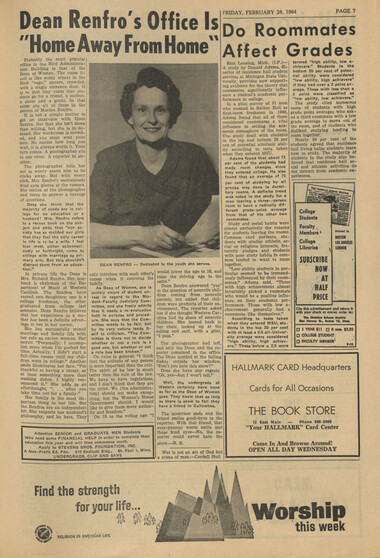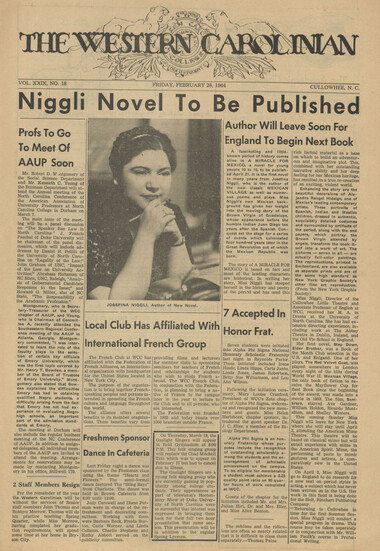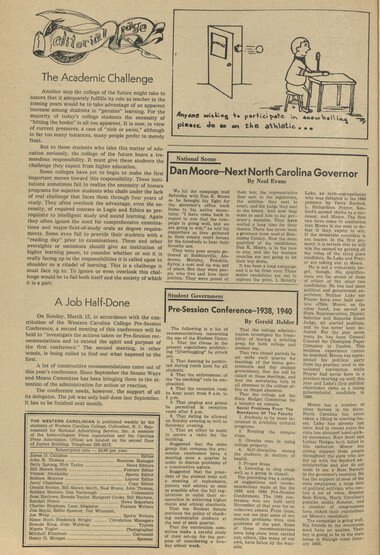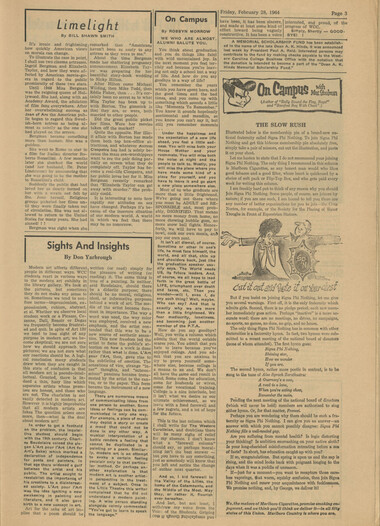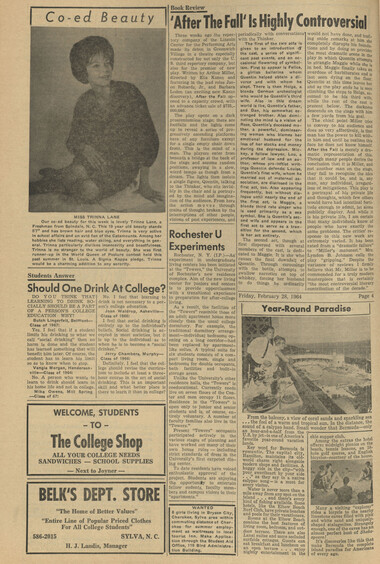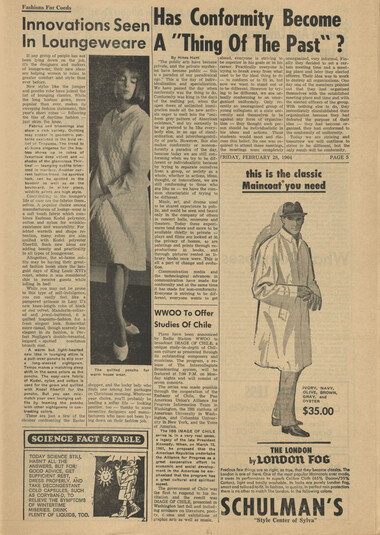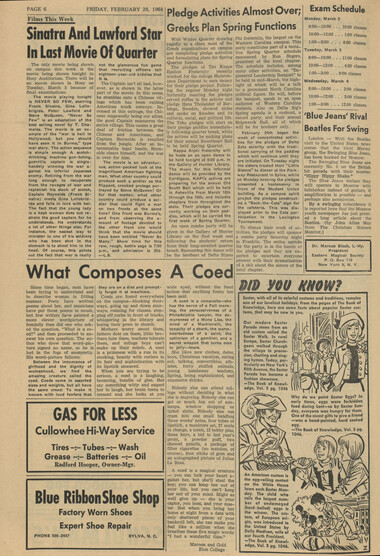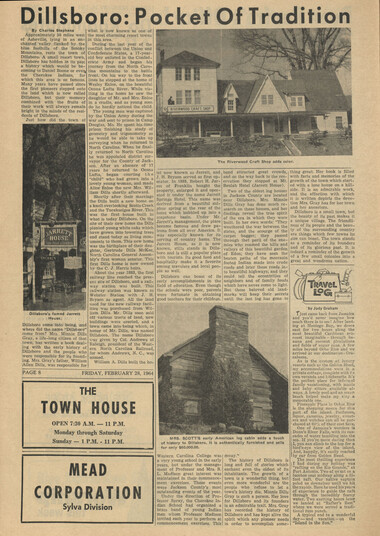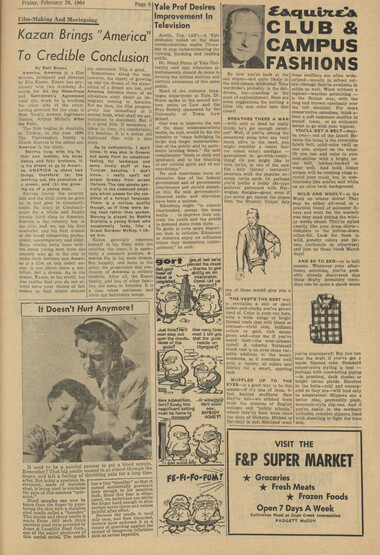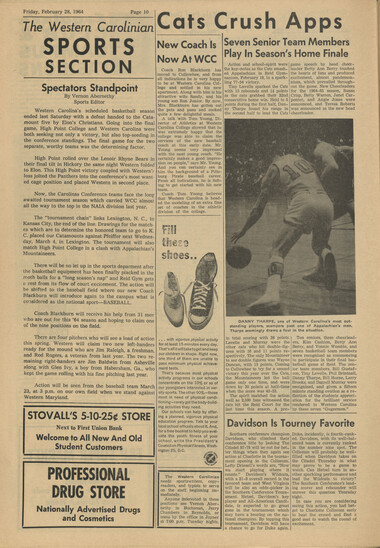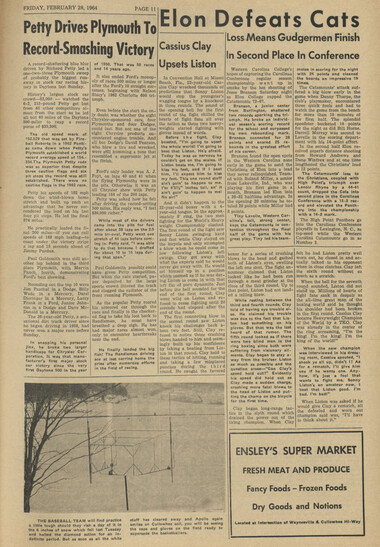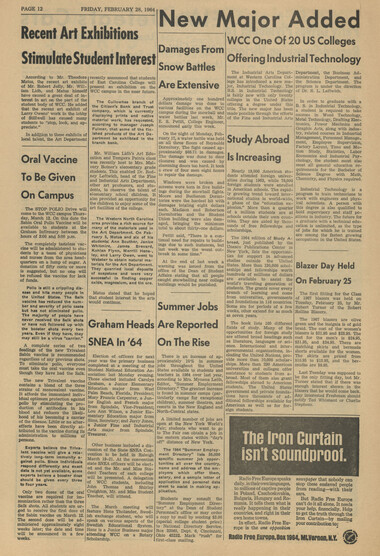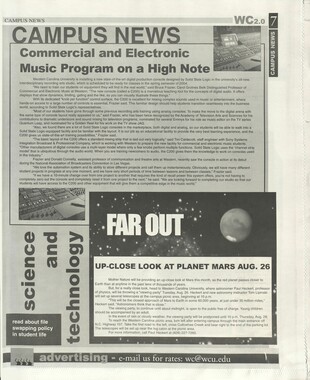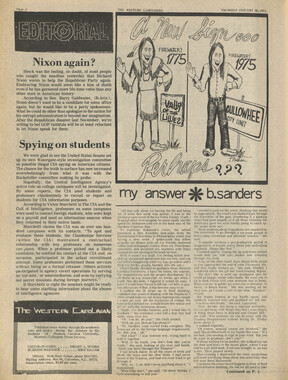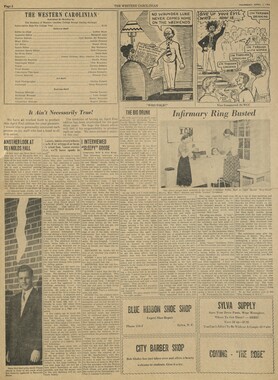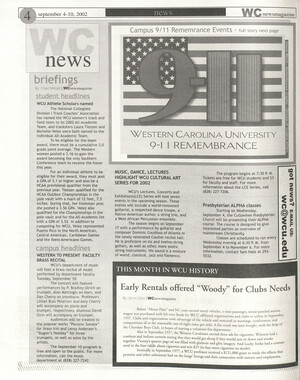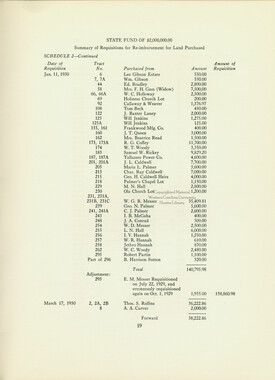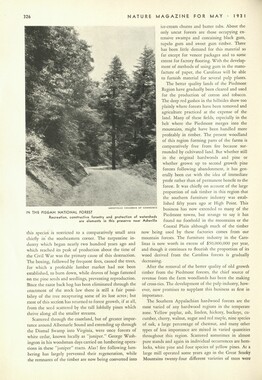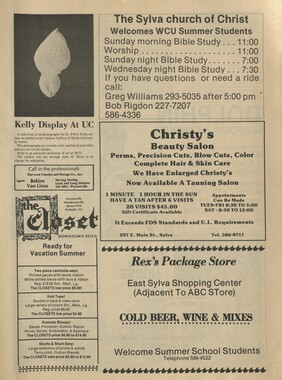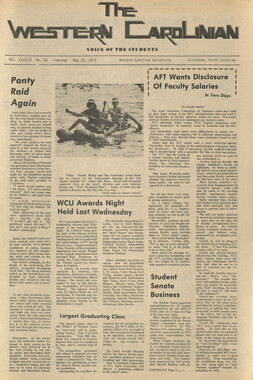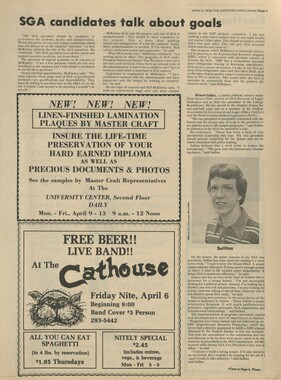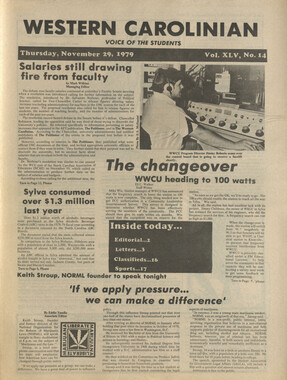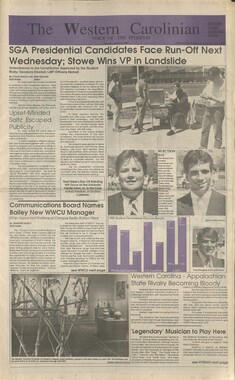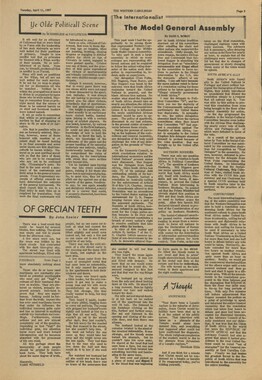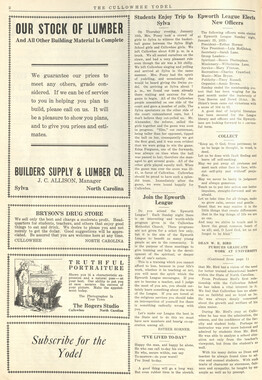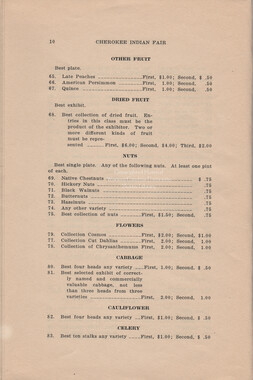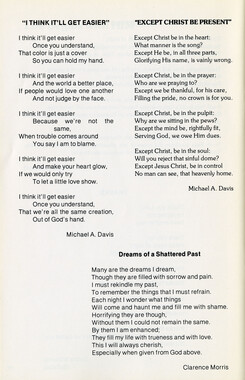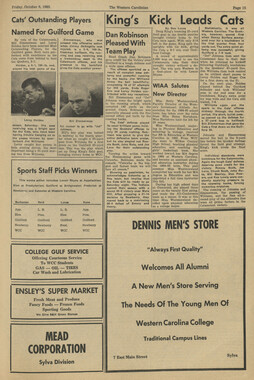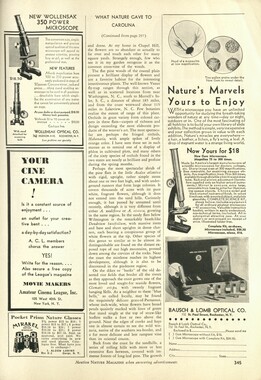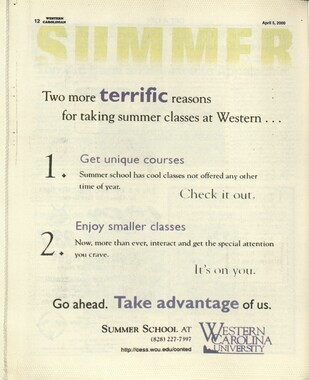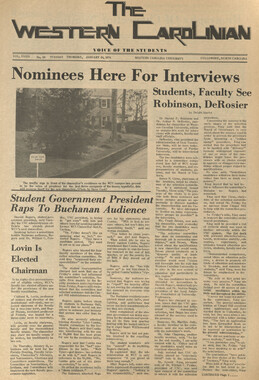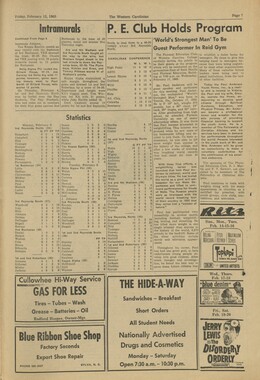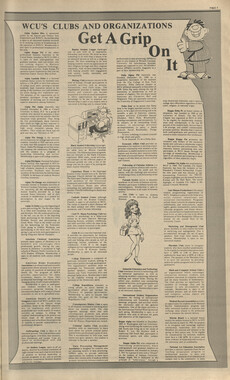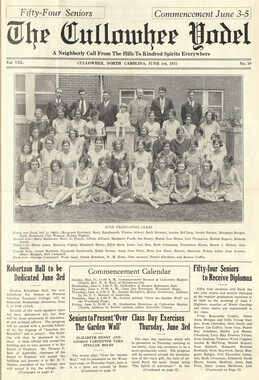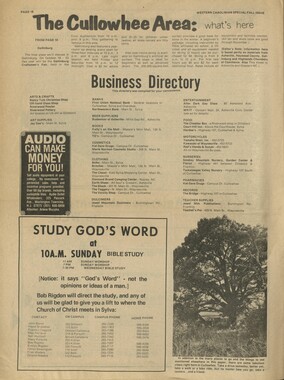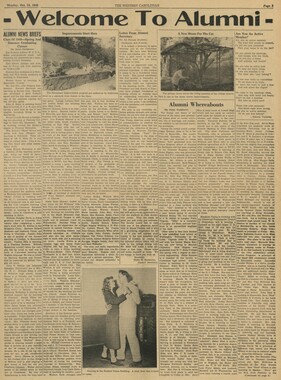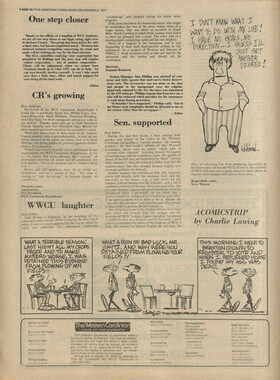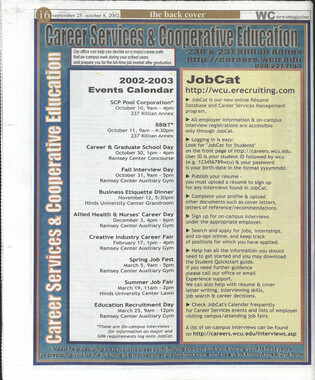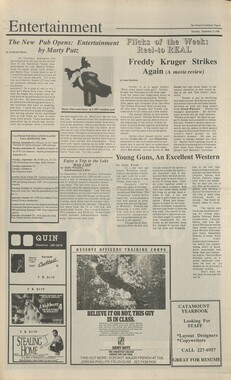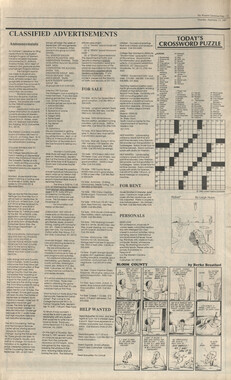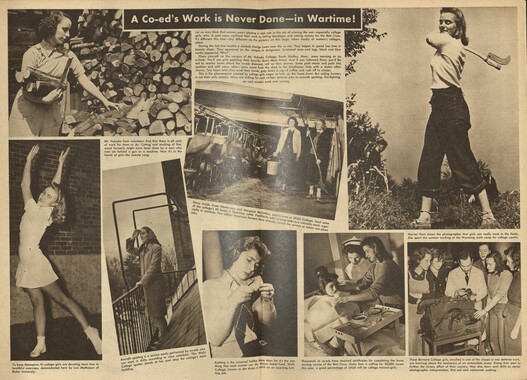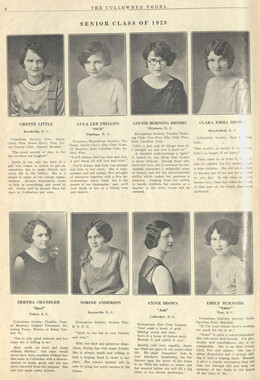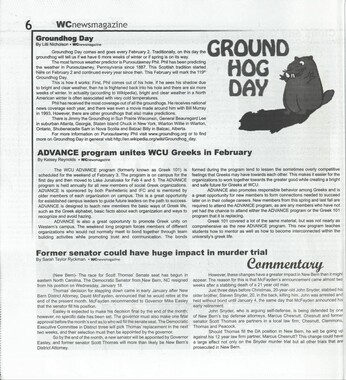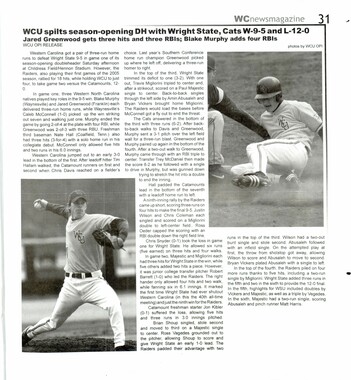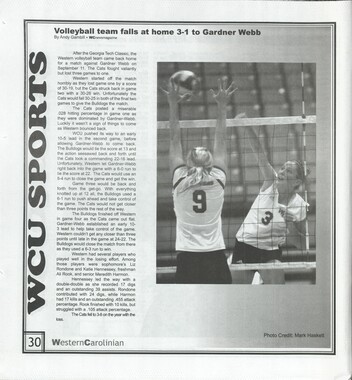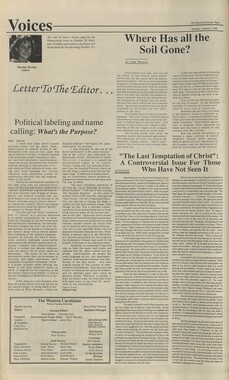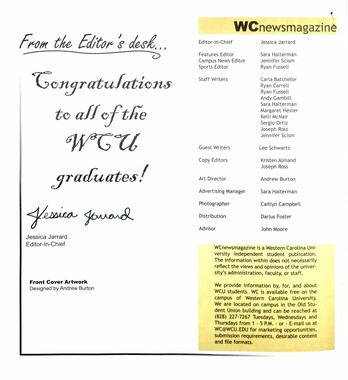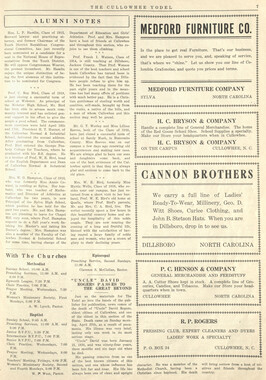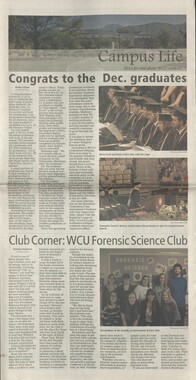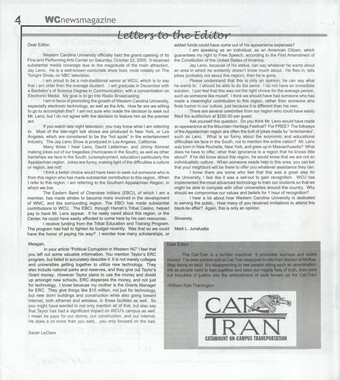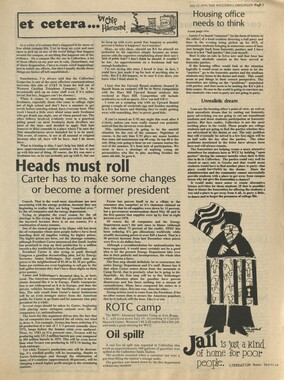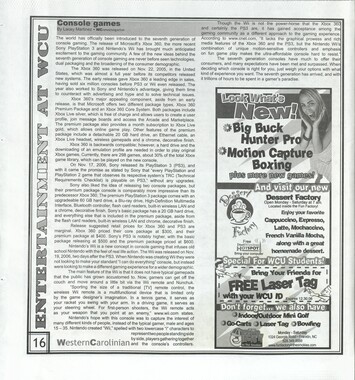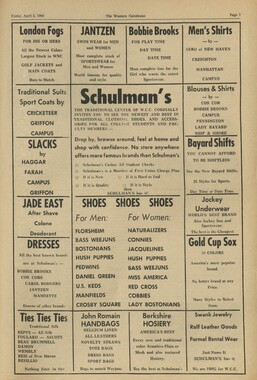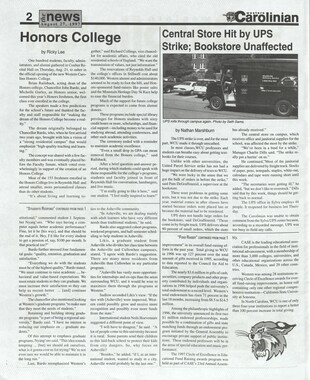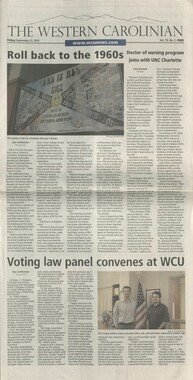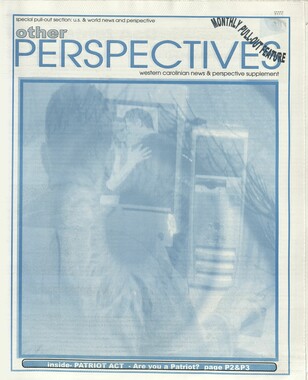Western Carolina University (20)
View all
- Canton Champion Fibre Company (2308)
- Cherokee Traditions (291)
- Civil War in Southern Appalachia (165)
- Craft Revival (1942)
- Great Smoky Mountains - A Park for America (2946)
- Highlights from Western Carolina University (430)
- Horace Kephart (941)
- Journeys Through Jackson (159)
- LGBTQIA+ Archive of Jackson County (85)
- Oral Histories of Western North Carolina (314)
- Picturing Appalachia (6873)
- Stories of Mountain Folk (413)
- Travel Western North Carolina (160)
- Western Carolina University Fine Art Museum Vitreograph Collection (129)
- Western Carolina University Herbarium (92)
- Western Carolina University: Making Memories (738)
- Western Carolina University Publications (2491)
- Western Carolina University Restricted Electronic Theses and Dissertations (146)
- Western North Carolina Regional Maps (71)
- World War II in Southern Appalachia (131)
University of North Carolina Asheville (6)
View all
- Allanstand Cottage Industries (62)
- Appalachian National Park Association (53)
- Bennett, Kelly, 1890-1974 (1463)
- Berry, Walter (76)
- Brasstown Carvers (40)
- Carver, George Washington, 1864?-1943 (26)
- Cathey, Joseph, 1803-1874 (1)
- Champion Fibre Company (233)
- Champion Paper and Fibre Company (297)
- Cherokee Indian Fair Association (16)
- Cherokee Language Program (22)
- Crowe, Amanda (40)
- Edmonston, Thomas Benton, 1842-1907 (7)
- Ensley, A. L. (Abraham Lincoln), 1865-1948 (275)
- Fromer, Irving Rhodes, 1913-1994 (70)
- George Butz (BFS 1907) (46)
- Goodrich, Frances Louisa (120)
- Grant, George Alexander, 1891-1964 (96)
- Heard, Marian Gladys (60)
- Kephart, Calvin, 1883-1969 (15)
- Kephart, Horace, 1862-1931 (313)
- Kephart, Laura, 1862-1954 (39)
- Laney, Gideon Thomas, 1889-1976 (439)
- Masa, George, 1881-1933 (61)
- McElhinney, William Julian, 1896-1953 (44)
- Niggli, Josephina, 1910-1983 (10)
- North Carolina Park Commission (105)
- Osborne, Kezia Stradley (9)
- Owens, Samuel Robert, 1918-1995 (11)
- Penland Weavers and Potters (36)
- Roberts, Vivienne (15)
- Roth, Albert, 1890-1974 (142)
- Schenck, Carl Alwin, 1868-1955 (1)
- Sherrill's Photography Studio (2565)
- Southern Highland Handicraft Guild (127)
- Southern Highlanders, Inc. (71)
- Stalcup, Jesse Bryson (46)
- Stearns, I. K. (213)
- Thompson, James Edward, 1880-1976 (226)
- United States. Indian Arts and Crafts Board (130)
- USFS (683)
- Vance, Zebulon Baird, 1830-1894 (1)
- Weaver, Zebulon, 1872-1948 (58)
- Western Carolina College (230)
- Western Carolina Teachers College (282)
- Western Carolina University (2008)
- Western Carolina University. Mountain Heritage Center (18)
- Whitman, Walt, 1819-1892 (10)
- Wilburn, Hiram Coleman, 1880-1967 (73)
- Williams, Isadora (3)
- Cain, Doreyl Ammons (0)
- Crittenden, Lorraine (0)
- Rhodes, Judy (0)
- Smith, Edward Clark (0)
- Appalachian Region, Southern (2569)
- Asheville (N.C.) (1923)
- Avery County (N.C.) (26)
- Blount County (Tenn.) (195)
- Buncombe County (N.C.) (1672)
- Cherokee County (N.C.) (283)
- Clay County (N.C.) (555)
- Graham County (N.C.) (236)
- Great Smoky Mountains National Park (N.C. and Tenn.) (519)
- Haywood County (N.C.) (3569)
- Henderson County (N.C.) (70)
- Jackson County (N.C.) (4912)
- Knox County (Tenn.) (35)
- Knoxville (Tenn.) (13)
- Lake Santeetlah (N.C.) (10)
- Macon County (N.C.) (420)
- Madison County (N.C.) (215)
- McDowell County (N.C.) (39)
- Mitchell County (N.C.) (132)
- Polk County (N.C.) (35)
- Qualla Boundary (982)
- Rutherford County (N.C.) (76)
- Swain County (N.C.) (2182)
- Transylvania County (N.C.) (270)
- Watauga County (N.C.) (12)
- Waynesville (N.C.) (86)
- Yancey County (N.C.) (72)
- Aerial Photographs (3)
- Aerial Views (60)
- Albums (books) (4)
- Articles (1)
- Artifacts (object Genre) (228)
- Bibliographies (1)
- Biography (general Genre) (2)
- Cards (information Artifacts) (38)
- Clippings (information Artifacts) (191)
- Copybooks (instructional Materials) (3)
- Crafts (art Genres) (622)
- Depictions (visual Works) (21)
- Design Drawings (1)
- Drawings (visual Works) (185)
- Envelopes (73)
- Exhibitions (events) (1)
- Facsimiles (reproductions) (1)
- Fiction (general Genre) (4)
- Financial Records (12)
- Fliers (printed Matter) (67)
- Glass Plate Negatives (381)
- Guidebooks (2)
- Internegatives (10)
- Interviews (815)
- Land Surveys (102)
- Letters (correspondence) (1013)
- Manuscripts (documents) (618)
- Maps (documents) (177)
- Memorandums (25)
- Minutes (administrative Records) (59)
- Negatives (photographs) (6090)
- Newsletters (1290)
- Newspapers (2)
- Notebooks (8)
- Occupation Currency (1)
- Paintings (visual Works) (1)
- Pen And Ink Drawings (1)
- Periodicals (193)
- Personal Narratives (10)
- Photographs (12976)
- Plans (maps) (1)
- Poetry (5)
- Portraits (4568)
- Postcards (329)
- Programs (documents) (181)
- Publications (documents) (2443)
- Questionnaires (65)
- Relief Prints (26)
- Sayings (literary Genre) (1)
- Scrapbooks (282)
- Sheet Music (2)
- Slides (photographs) (402)
- Songs (musical Compositions) (2)
- Sound Recordings (796)
- Specimens (92)
- Speeches (documents) (18)
- Tintypes (photographs) (8)
- Transcripts (322)
- Video Recordings (physical Artifacts) (23)
- Text Messages (0)
- A.L. Ensley Collection (275)
- Appalachian Industrial School Records (7)
- Appalachian National Park Association Records (336)
- Axley-Meroney Collection (2)
- Bayard Wootten Photograph Collection (20)
- Bethel Rural Community Organization Collection (7)
- Blumer Collection (5)
- C.W. Slagle Collection (20)
- Canton Area Historical Museum (2110)
- Carlos C. Campbell Collection (462)
- Cataloochee History Project (64)
- Cherokee Studies Collection (4)
- Daisy Dame Photograph Album (5)
- Daniel Boone VI Collection (1)
- Doris Ulmann Photograph Collection (112)
- Elizabeth H. Lasley Collection (1)
- Elizabeth Woolworth Szold Fleharty Collection (4)
- Frank Fry Collection (95)
- George Masa Collection (173)
- Gideon Laney Collection (452)
- Hazel Scarborough Collection (2)
- Hiram C. Wilburn Papers (28)
- Historic Photographs Collection (236)
- Horace Kephart Collection (861)
- Humbard Collection (33)
- Hunter and Weaver Families Collection (1)
- I. D. Blumenthal Collection (4)
- Isadora Williams Collection (4)
- Jesse Bryson Stalcup Collection (47)
- Jim Thompson Collection (224)
- John B. Battle Collection (7)
- John C. Campbell Folk School Records (80)
- John Parris Collection (6)
- Judaculla Rock project (2)
- Kelly Bennett Collection (1482)
- Love Family Papers (11)
- Major Wiley Parris Civil War Letters (3)
- Map Collection (12)
- McFee-Misemer Civil War Letters (34)
- Mountain Heritage Center Collection (4)
- Norburn - Robertson - Thomson Families Collection (44)
- Pauline Hood Collection (7)
- Pre-Guild Collection (2)
- Qualla Arts and Crafts Mutual Collection (12)
- R.A. Romanes Collection (681)
- Rosser H. Taylor Collection (1)
- Samuel Robert Owens Collection (94)
- Sara Madison Collection (144)
- Sherrill Studio Photo Collection (2558)
- Smoky Mountains Hiking Club Collection (616)
- Stories of Mountain Folk - Radio Programs (374)
- The Reporter, Western Carolina University (510)
- Venoy and Elizabeth Reed Collection (16)
- WCU Gender and Sexuality Oral History Project (32)
- WCU Mountain Heritage Center Oral Histories (25)
- WCU Oral History Collection - Mountain People, Mountain Lives (71)
- WCU Students Newspapers Collection (1923)
- Western North Carolina Tomorrow Black Oral History Project (69)
- William Williams Stringfield Collection (2)
- Zebulon Weaver Collection (109)
- African Americans (390)
- Appalachian Trail (35)
- Artisans (521)
- Cherokee art (84)
- Cherokee artists -- North Carolina (10)
- Cherokee language (21)
- Cherokee pottery (101)
- Cherokee women (208)
- Church buildings (189)
- Civilian Conservation Corps (U.S.) (111)
- College student newspapers and periodicals (2012)
- Dams (107)
- Dance (1023)
- Education (222)
- Floods (61)
- Folk music (1015)
- Forced removal, 1813-1903 (2)
- Forest conservation (220)
- Forests and forestry (1184)
- Gender nonconformity (4)
- Great Smoky Mountains National Park (N.C. and Tenn.) (181)
- Hunting (45)
- Landscape photography (25)
- Logging (119)
- Maps (83)
- Mines and mineral resources (8)
- North Carolina -- Maps (18)
- Paper industry (38)
- Postcards (255)
- Pottery (135)
- Railroad trains (72)
- Rural electrification -- North Carolina, Western (3)
- School integration -- Southern States (2)
- Segregation -- North Carolina, Western (5)
- Slavery (5)
- Sports (452)
- Storytelling (243)
- Waterfalls -- Great Smoky Mountains (N.C. and Tenn.) (66)
- Weaving -- Appalachian Region, Southern (280)
- Wood-carving -- Appalachian Region, Southern (328)
- World War, 1939-1945 (173)
Western Carolinian Volume 29 Number 18
Item
Item’s are ‘child’ level descriptions to ‘parent’ objects, (e.g. one page of a whole book).
-
-
Dean Renfro's Office Is "Home Away From Home11 Probably the most popular office in the Bird Administration Building is that of the Dean of Women. The room itself is like many others in the Bird "cage;" square, crowded, with a single entrance door. It is to that tiny room that students go for a friend, a mother. a sister and a guide. In that room sits all of these in the person of Marion Renfro. It is not a simple matter to get an interview with Dean Renfro. Not that she isn't more than willing, but she is in demand. Her workroom is crowded, and you must wait your turn. No matter how long you wait, it is always worth it. Your turn comes. A photographer sits in one chair. A reporter in another. The photographer tells her not to worry about him as he clicks away. But with every click, Mrs. Renf ro's enoromously kind eyes glance at the camera, She smiles at the photographer and turns to answer a barrage of questions. Does she think that the majority of coeds are in college for an education or a husband? Mrs. Renfro refers to a recent book on the subject and adds that "our society has so molded our girls that they feel the only career In life Is to be a wife. I feel that most, either subconsciously or forthright, come to college with marriage as primary aim. But this shouldn't distract them from an education." In private life the Dean is Mrs. Richard Renfro. Her hus band is chairman of the De partment of Music at Western Carolina. The Renfros have reared two daughters; one is a college freshman, the other graduated from college last semester. Dean Renfro believes that her experience as a mother has been a definite advantage to her in her career. She has successfully mixed marriage and family life with her role as career woman. Her secret: "Personally,- I accomplish more when I'm pushed for time. Actually, I didn't start a full-time career until my children were in college." Another smile illuminates her face. "I'm thankful at having a career, or at least something more than washing dishes. I highly recommend it." She adds as an afterthought, ". . . after you take time out for a family." Her family is the most important thing in her life. But the Renfros are an independent lot. She respects her husband's Philosophy, and he hers. They FRIDAY, FEBRUARY 28, 1964 PAGE 7 Do Roommates Affect Grades DEAN RENFRO — Dedicat only interfere with each other's career when it concerns the family. As Dean of Women, she Is acutely aware of student unrest in regard to the Student-Faculty Judiciary Committee, and she freely admits that it needs a re-evaluation both in purpose and procedure. She says that the Committee wants to be fair, but by its very nature lends Itself to criticism. "The Committee Is there not to decide whether or not a rule is a good one, but whether or not a rule has been broken." On rules in general: "I think that the attitude of any person is more important than the rule. The spirit of he law is much better than the rule of the law. We have to have regulations, and I don't think that they are too strict. We (the administration) should not make exceptions, but the Women's House Government should. I would like to give them more authority and freedom." On 18 as the voting age: "I Attention SENIOR and GRADUATE MEN Students Who need some FINANCIAL HELP in order to complete their education this year and will then commence work. Apply to STEVENS BROS. FOUNDATION, INC. A Non-profit Ed. Fdn. 610 Endlcott Bldg., St. Paul 1, Minn. UNDERGRADS, CLIP AND SAVE sd to the youth sne serves. would lower the age to 18, and raise the driving age to the same." Dean Renfro answered "yes" to the question of neurotic children coming from neurotic parents, but added that children were products of their environment. The reporter asked her if she thought Western Carolina had its share of neurotic children. She leaned back in her chair, looked up at the ceiling and said, with a glint, "I pass." The photographer had left, and only the Dean and the reporter remained in the office. The Dean nodded at the falling flakes outside her window, "Don't you hate this snow?" Does she have any regrets "Oh, yes—but I won't tell." Well, the undergrada at Western certainly have none as far as the Dean of Women goes. They know that as long as there is snow to fall they have a friend in Cullowhee. The Interview ends and the friend smiles good-byes to the reporter. With that friend, that ever-present warm smile and those kind eyes—No, the reporter could never hate the snow.—B. S. East Lansing, Mich. (IP.)— A study by Donald Adams, director of residence hall student services at Michigan State University, provides new supporting evidence for the theory that roommates significantly influence a student's academic performance in college. In a pilot survey of 51 men who roomed in Rather Hall as first-term freshmen in 1960, Adams found that all of them considered roommates a vital influence in setting the academic atmosphere of the room. The siudy dealt with students in the top and bottom 20 per cen of potential scholasic ability according to tests taken when they entered MSU. Adams fountf that about 75 per cent of the students had made room changes since they entered college. He also found that an average of 75 per cent of studying by all groups was done In dormitory rooms. A definite trend was noted In the study for a man leaving a three — person room to have a radically different grade-point average from that of his other two roommates. Study and social habits were almost exclusively the reasons for students leaving the rooms. Common card partners, students with similar athletic, social or religious interests, fraternity pledges and students with poor study habits in common tended to want to room together. "Low ability students in particular seemed to be tremendously influenced by their roommates," Adams said. "Those with high achievement almost invariably picked a roommate who would be a positive influence on their academic performance. Those with low a- chievement generally had a roommate like themselves." According to tests taken when they entered MSU, students In the top 20 per cent with at least a 2.5 all-University average were considered "high ability, high achievers." Those below a 2.5 were War is not an act of God but a crime of man.—Cordell Hull termed "high ability, low a- chlevers." Students In the bottom 20 per cent of potential ability were considered "low ability, high achievers" if they had over a 2 point average. Those with less than a 2 point were classified as "low ability, low achievers." The study cited numerous cases of students with high grade point averages who asked a third roommate with a low grade average to move out of the room, and of students who disliked studying tending to room together. Nearly 50 per cent of the students agreed that residence hall living helps students learn how to study. The majority of students in the study also believed that residence hall social and athletic activities do not detract from academic experiences. College Students Faculty, Members * College Libraries SUBSCRIBE NOW AT HALF PRICE ' Frlnl.d In BOSTON 10SANGRIS LONDON Clip this advtrtlitmtnt end return It with your check or money ordtr to: T*« CMMhs trim* MwlNr Om Nwmt ft* ImM II, Htm, Q 1 YEAR $11 Q 6 mos. $5.30 Q COLLEGE STUDENT □ FACULTY MEMBER1 ~ MS HALLMARK CARD Headquarters Cards for All Occasions THE BOOK STORE 12 East Main — Phone 586-2466 "Your HALLMARK" Card Center Come In And Browse Around! OPEN ALL DAY WEDNESDAY Find the strength for your life... RELIGION IN AMERICAN LIFE Worship this week
Object
Object’s are ‘parent’ level descriptions to ‘children’ items, (e.g. a book with pages).
-
The Western Carolinian is Western Carolina University’s student-run newspaper. The paper was published as the Cullowhee Yodel from 1924 to 1931 before changing its name to The Western Carolinian in 1933.
-
